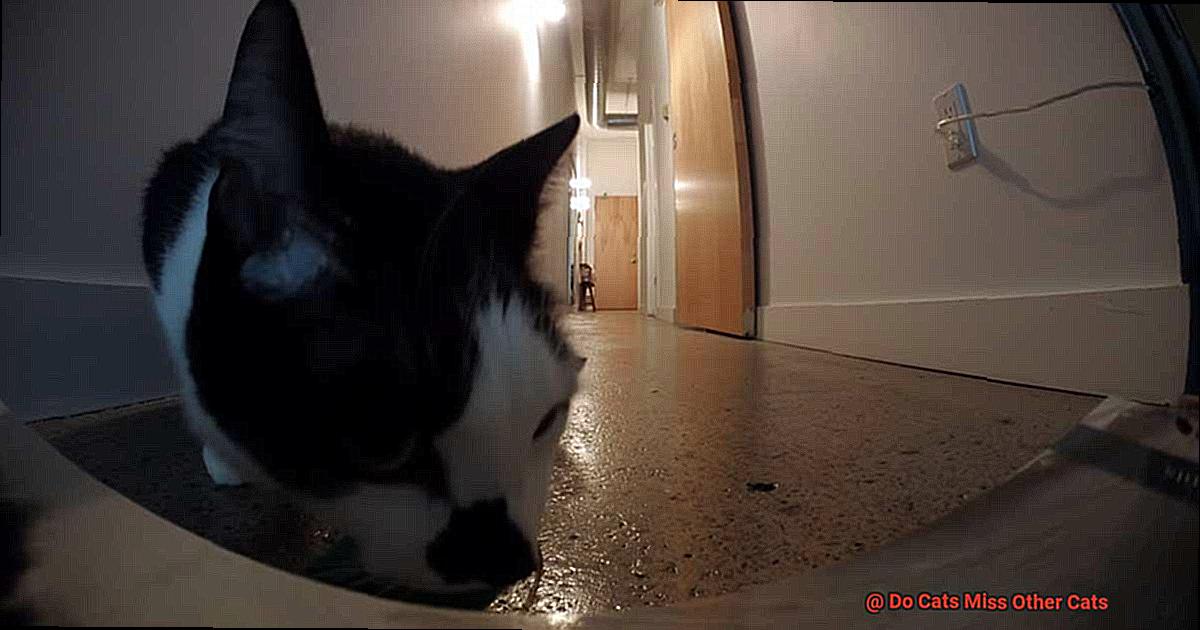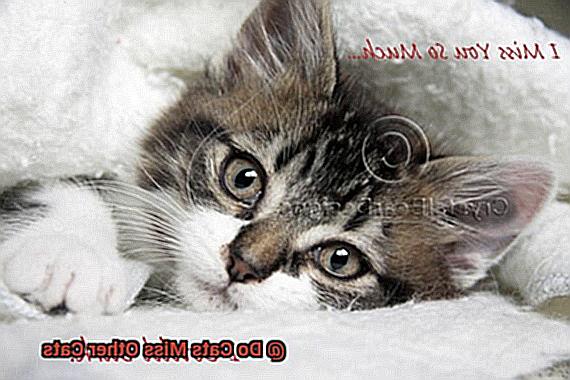Have you ever wondered if your cat misses their furry companion when you leave them alone all day?
It’s easy to assume that cats are content being solitary creatures, but feline behavior experts suggest otherwise. Cats may not have emotions like humans do, but they do have feelings and social needs.
So, the question remains: do cats actually dislike other cats? It’s important to note that cats are social animals and many of them thrive in a multi-cat household where they can interact and play with their feline friends.
However, some cats prefer to be the sole cat in the household. Despite this, cats have a memory and can recall other cats they’ve met before.

They may even have close relationships with particular individuals or littermates. If a cat’s companion suddenly disappears, they may display signs such as roaming the house, excessive meowing, or searching for their friend.
Remember that the next time you leave your cat alone, they could be missing their feline friend just as much as you miss them.
How Long Do Cats Grieve?
The duration of their grief varies from one cat to another, depending on various factors, such as age, personality, and their relationship with the deceased cat. Grief can last anywhere from a few days to several months.
During this time, your cat may display signs of distress such as lethargy, decreased appetite, increased vocalization, and changes in sleeping habits. It’s important to note that these symptoms could be indicative of other health conditions.
Therefore, consulting with a veterinarian is crucial if you notice any changes in your cat’s behavior. As a pet owner, there are things you can do to help your grieving cat.

Providing them with extra attention and affection will make them feel less lonely. Additionally, ensuring that they have a safe and secure environment will make them feel more secure.
Maintaining your cat’s routine as often as possible is also vital. Consistency in feeding and playtime routines will provide them with plenty of opportunities for exercise and enjoyment.

Comfort items such as blankets or toys that belonged to the deceased cat can also help your furry friend feel more stable and less alone. However, it’s important not to rush into getting another cat too soon.
Wait until your cat has had time to mourn and adjust before deciding to adopt another feline friend. Overall, it’s essential to be patient and understanding with your grieving feline friend during this difficult time.
Signs of Grief in Cats
One of the most common signs of distress in cats is a change in behavior.
A once outgoing and social cat may become withdrawn and reclusive, while a normally calm cat may become restless and agitated. Additionally, they may lose interest in food and water, which could lead to weight loss and dehydration.
Ensuring that your cat is eating enough food and drinking plenty of water is crucial during this period. Vocalization is also a sign of grief in cats.
A grieving feline may cry more often than usual or make strange noises such as howling or yowling. They may also become more clingy or demand more attention from their owners.
During this time, it’s essential to be patient and understanding with your cat, as they need extra love and care.
Physical symptoms of grief in cats can include lethargy, lack of energy, and decreased grooming habits.

They may also suffer from stress-related illnesses such as digestive problems or infections. It’s important to consult with a veterinarian if you notice any changes in your cat’s behavior or health since these symptoms could indicate underlying health issues.
Factors Affecting the Length of Grieving in Cats
Just like humans, cats go through the grieving process when they lose a companion.
However, the length of this process can vary depending on several factors. Let’s explore these factors and how they can affect your furry friend.
The bond between the two cats is one of the most influential factors in the length of grieving in cats. If the cats were close and had a strong relationship, it would take longer for them to adjust to life without their companion.
Losing a significant source of warmth and companionship can be challenging for cats. Conversely, if there was no close bond, the mourning process would have been shorter because the surviving cat may not have been as emotionally invested in their relationship.
Age is another determinant that can influence how long a cat grieves. Younger cats will adjust to being alone more quickly, while older cats may have a harder time adapting.
Senior cats have more established routines, making it difficult for them to adjust to changes in their environment. The circumstances of how the other cat died can also impact the grieving process.
If it was sudden and unexpected, it could be challenging for the remaining cat to cope with their loss. Additionally, if there was a traumatic event involved in the other cat’s death, it could increase the grieving period for the surviving cat.
Changes in routine or environment can cause more anxiety for cats who are already dealing with grief. To help the surviving cat feel more secure, it’s essential to maintain consistency in routine and environment as much as possible.
Human interaction also plays a vital role in a cat’s grieving process. During this time, cats may seek out more attention from their owners or withdraw and become more distant.
It’s crucial to be patient and understanding with your cat during this period and allow them to grieve in their way. Providing them with warmth and reassurance can also help them through this difficult time.
Remember that every cat grieves differently, so be patient and compassionate with your furry friend as they work through their emotions.
How to Help a Grieving Cat
Losing a furry friend can be a heartbreaking experience for cats, just like it is for humans.
Watching your feline companion grieve can be painful, and it’s important to know how to support them during this difficult time. Here are five sub-sections to help you understand how to help a grieving cat.
The Power of Love and Attention
Cats love attention and affection, and this becomes even more important when they are going through a tough time. Spending extra quality time with your feline friend, playing with them, and cuddling them can provide comfort and reassurance that they are not alone. Let your cat take the lead on what they want to do, and be patient with them if they are not in the mood for playtime.
Create a Safe Haven for Your Cat
Creating a safe and comfortable environment for your cat is essential during their grieving process. Providing them with a cozy bed, safe hiding spots, and plenty of sunlight can help create a calming atmosphere. Maintaining a consistent schedule can also help them feel secure during this time of transition. Consider providing your cat with a special object or spot that reminds them of their lost companion, such as a favorite toy or blanket.
Be Patient and Understanding
Grief is a process that takes time, and each cat will have their unique way of coping with the loss of their companion. It’s crucial to be patient with your furry friend during this grieving period.
Let them take as much time as they need to adjust to their new reality. Don’t force them into situations they are not comfortable with, and provide them with space when they need it.
Monitor Your Cat’s Health
Grief can take a toll on a cat’s physical well-being, so keeping an eye on their appetite, water intake, and litter box habits is crucial. If you notice any changes in their behavior or health, consult with your veterinarian immediately. They can provide guidance on any additional steps that may be necessary to support your cat’s emotional well-being.
Consider Another Companion
While it may be tempting to get another cat right away to keep your grieving cat company, it’s important to give them time to recover without their companion. If you do decide to introduce another cat into the household, do so slowly and allow your grieving cat plenty of space and time to adjust.
In conclusion, helping a grieving cat requires patience, compassion, and understanding. By giving your feline friend extra love and attention, creating a safe haven for them, being patient with their grieving process, monitoring their health, and considering another companion if appropriate, you can help them through this difficult time.
Remember that each cat grieves differently, so pay attention to your cat’s needs and emotions and adjust accordingly.
QmxTjo5co-k” >
Introducing a New Feline Companion Too Soon
Losing a feline companion can be devastating for cats, just like it is for us humans.
During this time of grief, it’s natural to want to fill the void and bring in a new feline friend right away. However, introducing a new cat too soon can cause stress and confusion for your grieving cat.

To help your cat cope with their loss, it’s essential to wait until they have had enough time to process their emotions before introducing a new furry companion. Experts recommend waiting at least a few months before bringing in a new cat.
During this period, your cat needs extra attention and support. Shower them with love and affection, create a safe and secure environment for them, and be patient during their grieving process.
If you’re planning to introduce a new cat, it’s important to do so gradually and carefully. Start by keeping the cats in separate rooms and allowing them to get familiar with each other’s scent through a closed door.
This will give them time to adjust before they meet face-to-face. As they become more comfortable with each other’s scent, you can gradually introduce them under supervised conditions.
Keep their initial interactions short and positive, and be prepared to separate them if necessary. With time, they should develop a bond and become comfortable living together.
It’s important to remember that every cat is unique, and some may take longer than others to adjust to a new feline companion. Be patient and understanding, provide plenty of love and support to both cats during this transition period.
So, introducing a new feline companion too soon can cause confusion and anxiety for your grieving cat. Waiting until they have had enough time to process their emotions is crucial before bringing in a new furry friend.
Also Read: Do Cats Remember Their Owners? – 21Cats.org
Conclusion
In conclusion, cats are not solitary creatures and can form strong bonds with other felines.
Losing a companion can be a difficult time for them, and they may display signs of grief such as wandering aimlessly or excessive meowing. As pet owners, it’s our responsibility to provide a secure environment and maintain their routine to help them feel more comfortable during this difficult period.
Introducing a new cat too soon can cause confusion and anxiety in your grieving furry friend. It’s important to wait until they’ve had enough time to process their emotions before bringing in a new companion.
When introducing the new cat, do so gradually and with care while still giving them plenty of love and attention. Just like humans, every cat grieves differently, so it’s important to be patient and understanding during this process.
With time, most cats will come to terms with the loss of their companion and begin moving forward with love and care from their human family.

